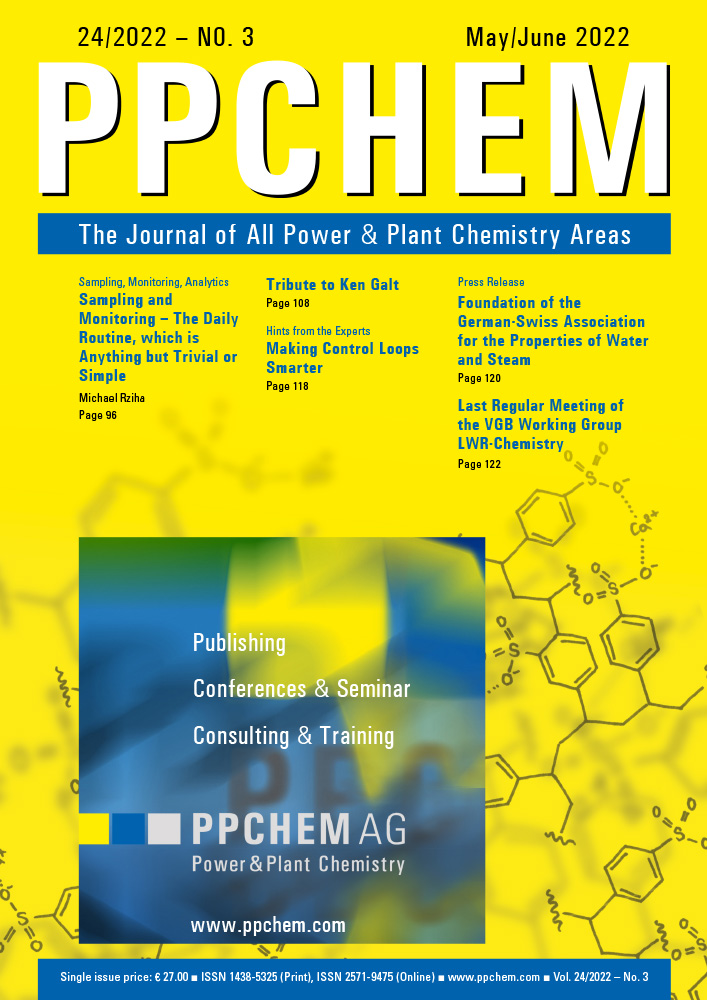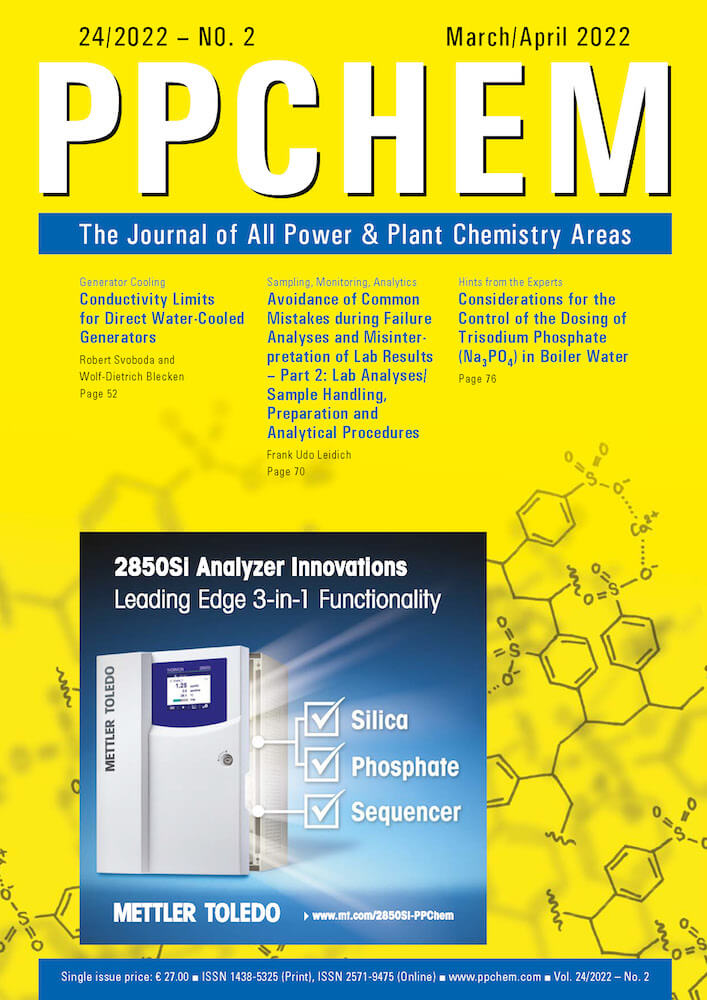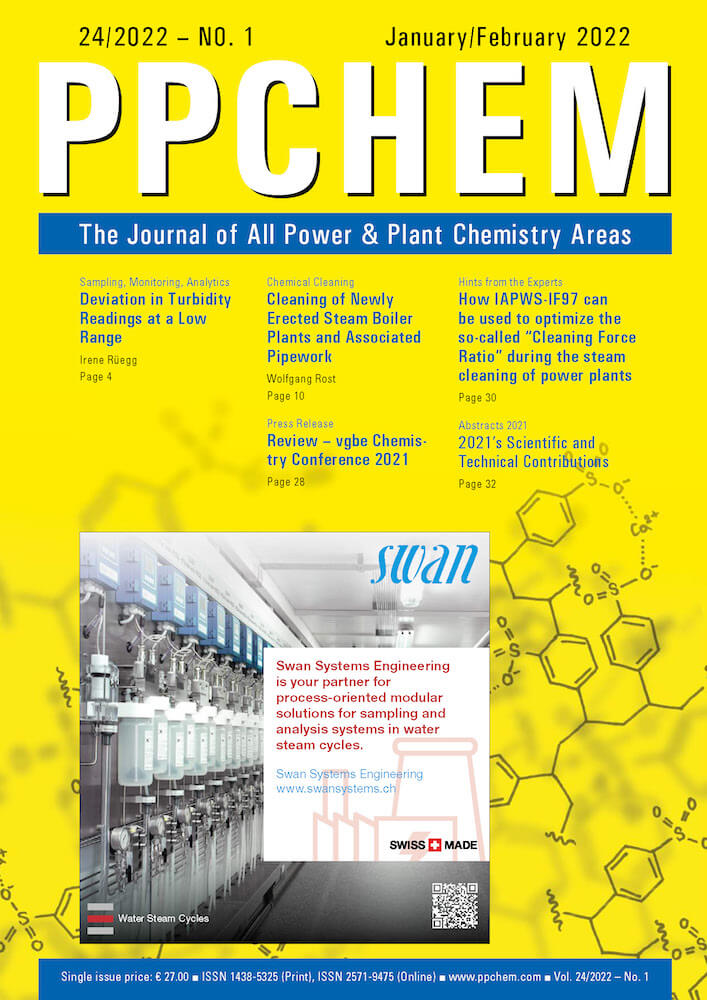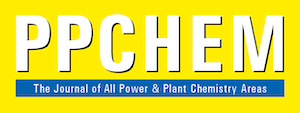Author: anderthalbAdmin
Issue 03 (2022)

For members only
ABSTRACTS
Sampling and Monitoring – The Daily Routine, Which Is Anything but Trivial or Simple
Michael Rziha
This article highlights some crucial and essential topics related to sampling and monitoring and how to obtain correct and representative samples and useful results.
Some classic mistakes; still experienced today in numerous plants; are highlighted as well.
Hints are given on how to avoid such mistakes and how to minimize the bias of samples. This article focuses on the most important basic rules for correct and representative sampling; but also draws attention to the most common mistakes being made.
PPCHEM® 2022, 24(3), 96–103
For Members only
Tribute to Ken Galt
It is our sad duty to inform you that Ken Galt passed away on May 1, 2022. He had been a member of the International Advisory Board (IAB) of the PPCHEM journal since the summer of 2020. Ken Galt was an outstanding scientist in the field of power plant chemistry, contributing a wealth of valuable research findings, notably studies on many topics.
PPCHEM® 2022, 24(3), 108
HINTS FROM THE EXPERTS
Making Control Loops Smarter
For some applications in power plants; it is not a good option to wait until control loops reach the setpoint based solely on the reaction to the control deviation over time; as this may cause activation of warning signals or; in the worst case; may even trigger protection commands due to a delay in reaching the required setpoint. Some control loops are additionally susceptible to undesired oscillations. Hence; these affected control loops should be made smarter; so they behave more stably and react faster.
How this can be easily achieved is explained here with various examples.
PPCHEM® 2022, 24(3), 118–119
For Members only
Foundation of the German-Swiss Association for the Properties of Water and Steam (GSAPWS) on April 1, 2022, in Potsdam, Germany
On 1 April 2022; 13 delegates met in Potsdam; Germany; for the founding meeting of the German Swiss Association for the Properties of Water and Steam. This meeting was also the first in-person meeting of the German and the Swiss National Committees since the start of the Covid-19 pandemic.
PPCHEM® 2022, 24(3), 120–121
Press Release: Last Regular Meeting of the VGB Working Group LWR-Chemistry at the NPP Emsland
Dr. Timo Stoll & Jörg Fandrich
On May 3–4; 2022; the last regular meeting of the VGB Working Group Light Water Reactor (LWR)-Chemistry took place at the nuclear power plant (NPP) Emsland; Germany. In addition to the technical experts of most of the German nuclear power plants; experts from all the Swiss nuclear power plants; the Netherlands; Spain and Belgium as well as from Framatome GmbH as consulting plant manufacturer participated.
PPCHEM® 2022, 24(3), 122–123
E-Paper – Issue 03 (2022)
Issue 02 (2022)

For members only
ABSTRACTS
Conductivity Limits for Direct Water-Cooled Generators
Robert Svoboda and Wolf-Dietrich Blecken
For normal operation, a conductivity limit of ≤ 0.2 μS · cm–1 is an indirect indicator of correct pH and restricts undue corrosion. With protective additives, e.g., NaOH for alkaline treatment, a higher limit corresponding to the objective of the treatment is appropriate.
With too high conductivity the water inside the insulating hoses of high-voltage stator windings will warm up and if it boils there is a risk of electric flashover inside the insulating hose with damaging consequences. Therefore, a short-term action limit in the order of 10 μS · cm–1 has been set by the industry in the past.
With correct water flow, conductivity inside the insulating hoses at these values does not warm up the water significantly and there are no restrictions regarding the duration of such an event.
However, when cooling water flow is lost, the water inside the insulating hoses will warm up exponentially with time. The time until boiling has a strong (square) dependence on the rated generator voltage, as well as on the insulating hose length, and has a linear dependence on water resistivity. The spatial position of insulating hoses (hoses are mounted vertically, horizontally, or bent) is also of importance. In addition, the stationary cooling water inside the stator bars, as well as the entire stator winding, is subjected to critical temperatures, especially at high load conditions. Therefore, appropriate action must be taken prior to reaching the water boiling level. To avoid a costly stator winding breakdown, the cooling water flow must be restored at once. Otherwise, the generator has to be shut down completely as soon as possible.
PPCHEM® 2022, 24(2), 52–63
For Members only
Avoidance of Common Mistakes during Failure Analyses and Misinterpretation of Lab Results – Part 2: Lab Analyses / Sample Handling, Preparation, and Analytical Procedures
Frank Udo Leidich
For a proper failure analysis or root cause analysis (RCA), a great deal of data and evidence-based information is needed. Within this context, various types of samples from different locations need to be taken for chemical and/or metallurgical examination. In addition to proper and correct sampling without alteration of the composition or contamination of the samples, which is described in the first article of this short series [1], it is of utmost importance to use the right analytical methods and execute sample preparation carefully. This includes being aware of the basic principles of the methods applied and of course knowing their limits. This article discusses the analytical part of an RCA and is the second part in a short series of ongoing articles.
PPCHEM® 2022, 24(2), 70–75
For Members only
HINTS FROM THE EXPERTS
Considerations for the Control of the Dosing of Trisodium Phosphate (Na3PO4) in Boiler Water
In the recent past, various organizations have been trying to establish a more or less full automatization of the dosing control for the phosphate boiler water treatment (typically called PT), similar to the well-established and well-functioning automatic dosing control of ammonia. Although this may sound easy, as nowadays very reliable instruments and sampling systems are available, it is relatively difficult to implement, especially for PT, as the entire phosphate chemistry is very complex compared to that of ammonia. Therefore a safe and reliable automatic control of PT involves a lot of traps and risks which must be considered. The most common and challenging issues in this respect are described here. Although this list may not be complete, it could be used to reconsider the idea of fully automated control of phosphate dosing.
PPCHEM® 2022, 24(2), 76–81
For Members only
E-Paper – Issue 02 (2022)
Article – Issue 02 (2022) – Avoidance of Common Mistakes during Failure Analyses and Misinterpretation of Lab Results – Part 2: Lab Analyses / Sample Handling, Preparation, and Analytical Procedures
Article – Issue 02 (2022) – Conductivity Limits for Direct Water-Cooled Generators
Article – Issue 02 (2022) – Considerations for the Control of the Dosing of Trisodium Phosphate (Na3PO4) in Boiler Water
E-Paper – Issue 01 (2022)
Issue 01 (2022)

For members only
ABSTRACTS
Deviation in Turbidity Readings at a Low Range
Irene Rüegg
Various factors contribute to deviations encountered in low turbidity readings by different analyzers. Turbidity measurement is instrument-dependent; different instruments calibrated with formazine according to the standard methods only show identical readings on a sample if the instruments incorporate the deviation factors. This article examines the interferences that affect a “zero” measurement and demonstrates how the concept of the Swan AMI Turbiwell turbidity analyzer reduces these inaccuracies.
PPCHEM® 2022, 24(1), 4–8
For Members only
Cleaning of Newly Erected Steam Boiler Plants and Associated Pipework
Wolfgang Rost
Experience gained over the years has shown that the strict adherence to prudent industry practice regarding the clean assembly of steam generator and water/steam cycle systems is the key to quickly establishing normal and trouble-free steam turbine operation of newly built power plants. It is therefore most valuable to understand what kinds of contamination can occur in what production step, what adverse consequences they imply, and how to generally avoid them by setting up very simple guidelines to start with. In addition, it is very helpful to know what sort of remedies exist as effective corrective measures if things go wrong in the first place. The knowledge of what state-of-the-art cleaning procedures exist and how they are conducted properly is also a very important key to success. If all the aforementioned points are adhered to, a reduction in execution time and money expenditure will be the result at the end of the day.
PPCHEM® 2022, 24(1), 10–23
For Members only
Review – vgbe Chemistry Conference 2021
Andreas Wecker and Sabine Kuhlmann
The 57th vgbe Chemistry Conference took place again as an attendance event. As usual, this chemistry conference was also accompanied by a trade exhibition with 21 national and international exhibitors. The approximately 160 participants were offered an interesting lecture programme.
PPCHEM® 2022, 24(1), 28–29
HINTS FROM THE EXPERTS
How IAPWS-IF97 can be used to optimize the so-called “Cleaning Force Ratio” during the steam cleaning of power plants
Throughout the entire process of the fabrication and construction of newly erected power plants, contaminants are introduced into the systems of the steam generator and the water/steam cycle due to the nature of the work. Some of these contaminants may not be removed successfully during chemical cleaning. Thus, due to the cleanliness requirements regarding the absence of particles, steam systems of power plants must undergo steam-blow operation prior to commencing the first steam admission to the turbine.
Therefore, all steam pipes routed to the steam turbine must be steam-blown by using enough “force” to remove solid contaminants effectively. The so-called “Cleaning Force Ratio” (CFR) is used to determine whether this required “force” is achieved during steam cleaning.
PPCHEM® 2022, 24(1), 30–31
For Members only
2021’s Scientific and Technical Contributions
PPCHEM® 2022, 24(1), 32–40

